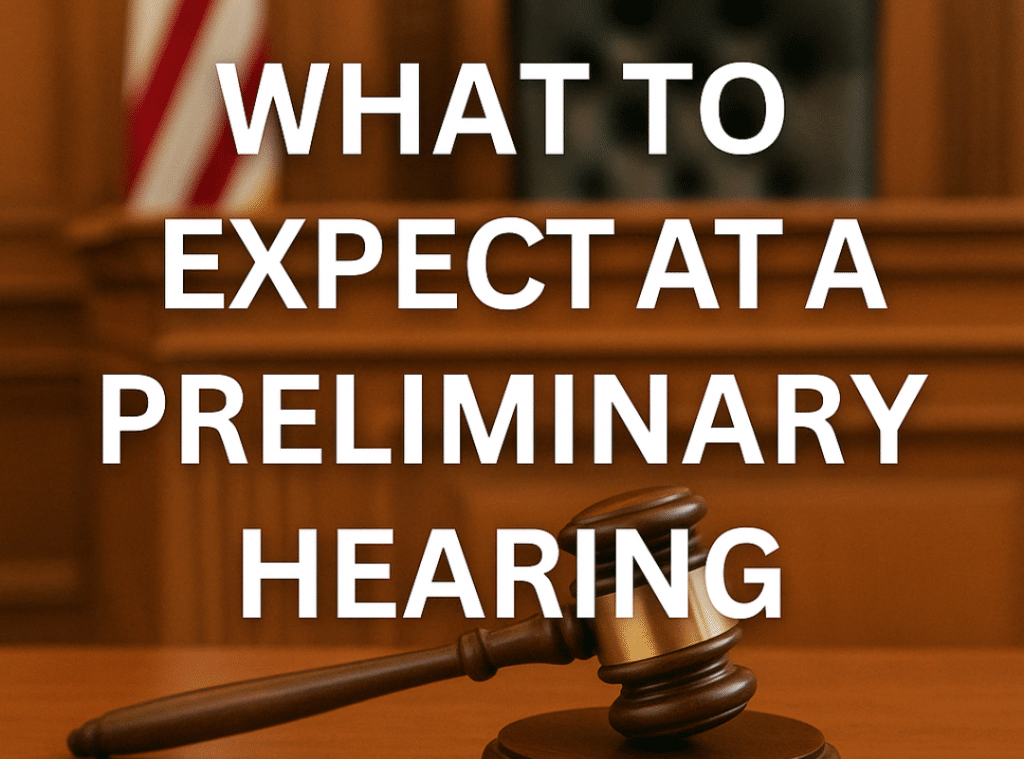
When facing felony charges in Wisconsin, one of the earliest and most pivotal stages in the process is the preliminary hearing. This procedural safeguard plays a critical role in determining whether your case will be allowed to move forward. While it does not decide guilt or innocence, it does give both the state and the defense a chance to examine the foundation of the case. If you’ve been charged with a felony in Madison, Dane County, or elsewhere in Southern Wisconsin, understanding your rights and the function of this hearing is essential.
What Is a Preliminary Hearing in Wisconsin?
Under Wis. Stat. § 970.03, a preliminary hearing is required in felony cases unless the defendant waives it or certain statutory exceptions apply. It must occur within 10 days of the initial appearance if the defendant is in custody, or 20 days if not, unless the court finds cause to extend the deadline.
The purpose of a preliminary hearing is simple but crucial: to determine whether there is probable cause to believe that:
• A felony was committed, and
• The defendant committed it.
This probable cause standard is lower than the burden of proof required at trial (beyond a reasonable doubt), but it is enough to bind a case over for prosecution if satisfied.
What Happens at a Preliminary Hearing?
The state must present evidence showing probable cause. Since State v. O’Brien, 223 Wis. 2d 303 (1999), prosecutors may use hearsay to establish probable cause, often relying on a police officer’s summary of the investigation. This limits the need for live witnesses and speeds up the process.
The defense may cross-examine witnesses but generally cannot present its own evidence unless arguing that probable cause is entirely lacking. If the judge finds no probable cause, the felony charge is dismissed—though the state can refile charges if new evidence is discovered.
If probable cause is found, the case proceeds to arraignment on the Information (the formal charging document).
Your Right to Counsel and Waiver Options
You have the right to counsel at the preliminary hearing. The court must confirm that any waiver of the hearing is knowing, intelligent, and voluntary. Waiving this step generally allows the prosecution to proceed to the next phase without showing probable cause. In some circumstances, waiving the hearing may allow you to avoid coming to court for the preliminary hearing and can speed up the process of obtaining the discovery in your case.
Limitations of the Preliminary Hearing
A preliminary hearing does not determine guilt or innocence. Additionally:
• The defense typically does not present evidence.
• Motions to suppress evidence are not heard at this stage.
• Affirmative defenses, such as self-defense, are not litigated.
• A jury is not involved; only the judge determines whether probable cause exists.
Under State v. Avery, 80 Wis. 2d 305 (1977), even illegally obtained evidence may be used to support bindover at this stage.
Strategic Importance for Defense Attorneys
Although limited, the preliminary hearing can be a powerful tool for defense counsel. It allows:
• Testing the strength of the prosecution’s case
• Pinning down witness testimony for potential impeachment later
• Assessing police conduct and preparation
In some cases, it may inform decisions about pretrial motions or negotiations.
Facing Felony Charges in Madison or Southern Wisconsin? Let DK Anderson, S.C. Help.
If you or a loved one is scheduled for a preliminary hearing in Dane County, Rock County, or any surrounding area, having a skilled criminal defense attorney on your side can make all the difference. At DK Anderson, S.C., we understand the strategies that can be employed even in these early stages to protect your rights and set the tone for your defense.
Contact us today for a free consultation and ensure that your case is in experienced hands.
Call Now: (608) 204-5807
FAQs About Preliminary Hearings in Wisconsin
A preliminary hearing is used to determine whether there is probable cause to believe a felony was committed and that the defendant committed it. It is not a trial and does not determine guilt or innocence.
Yes, unless the hearing is waived with your attorney’s assistance. The court requires your presence to ensure you understand your rights.
Not in the traditional sense. However, if the state fails to establish probable cause, the charge can be dismissed. This doesn’t preclude the state from refiling with new evidence.
That depends on the strategy. In some cases, waiving may be appropriate, especially if negotiations are underway. In others, your attorney may want to use the hearing to gain insight into the prosecution’s case.
Yes. Wisconsin courts allow the state to use hearsay evidence to establish probable cause during a preliminary hearing, as upheld in State v. O’Brien, 223 Wis. 2d 303 (1999).
Our Practice Areas
Drunk Driving
Whether you are charged with a first offense, or a fifth offense, our Wisconsin OWI attorneys can help.
Violent Crimes
A conviction for any one of Wisconsin's violent crimes will have significant consequences.
Drug Charges
Our Wisconsin Drug charge attorneys know the law and how to apply that law in the court room.
Domestic Violence
A conviction for a domestic violence charge in Wisconsin has additional consequences.
Property Crimes
Wisconsin property crimes include theft, forgery, and criminal damage to property.
Sex Offenses
Not much will change your life like a conviction for one of Wisconsin's sex offense charges.
Traffic Citations
Although less serious than a criminal charge, a traffic citation can effect your driver's license.
